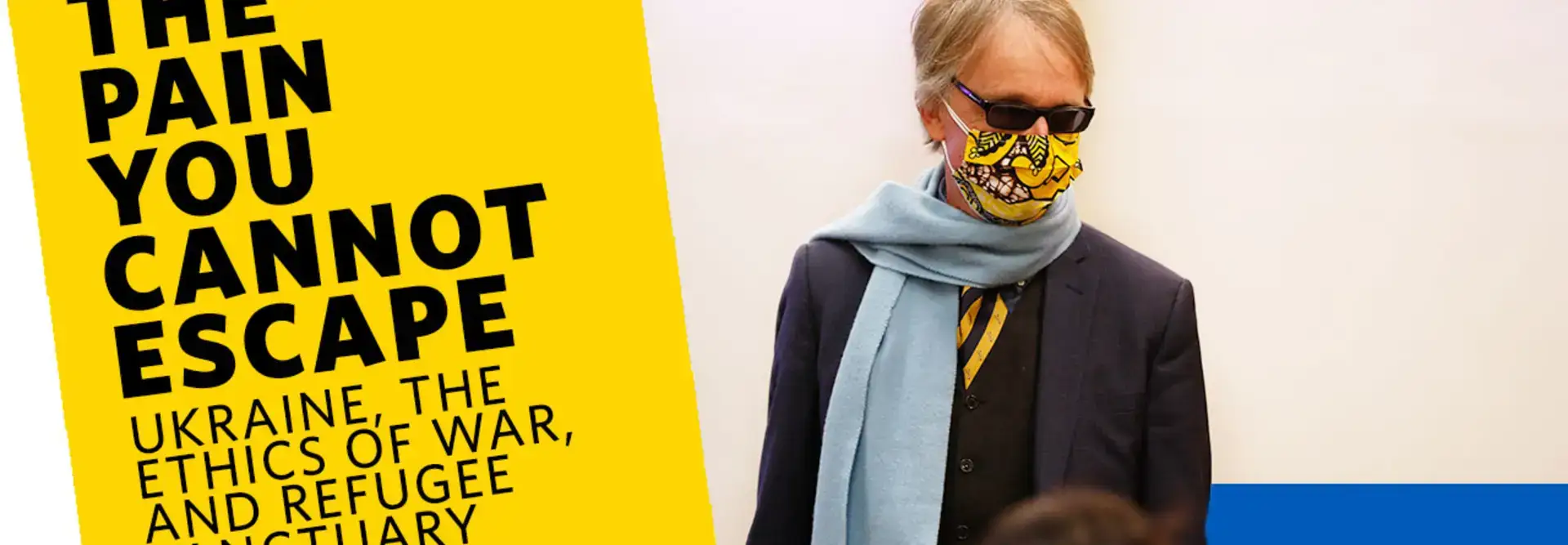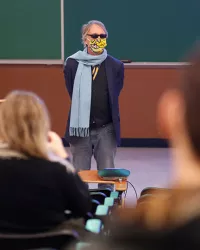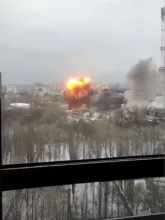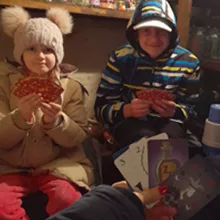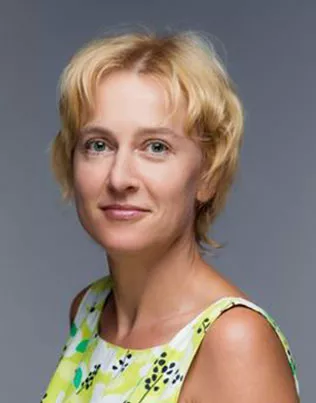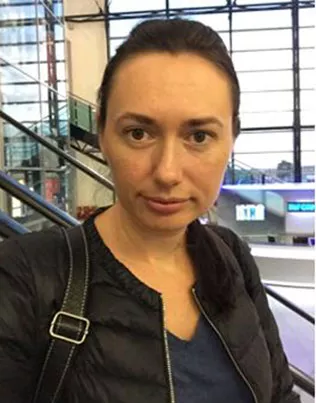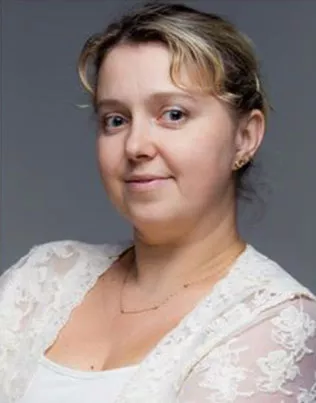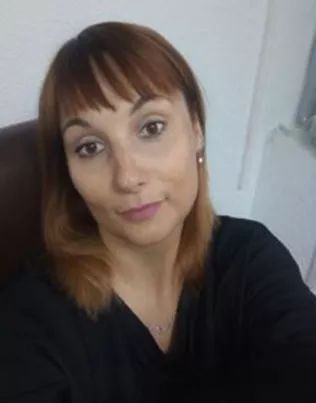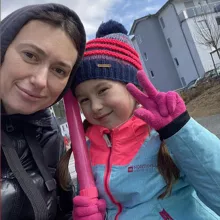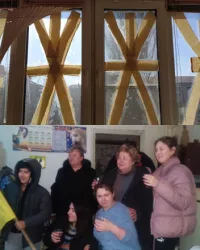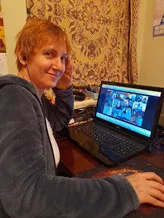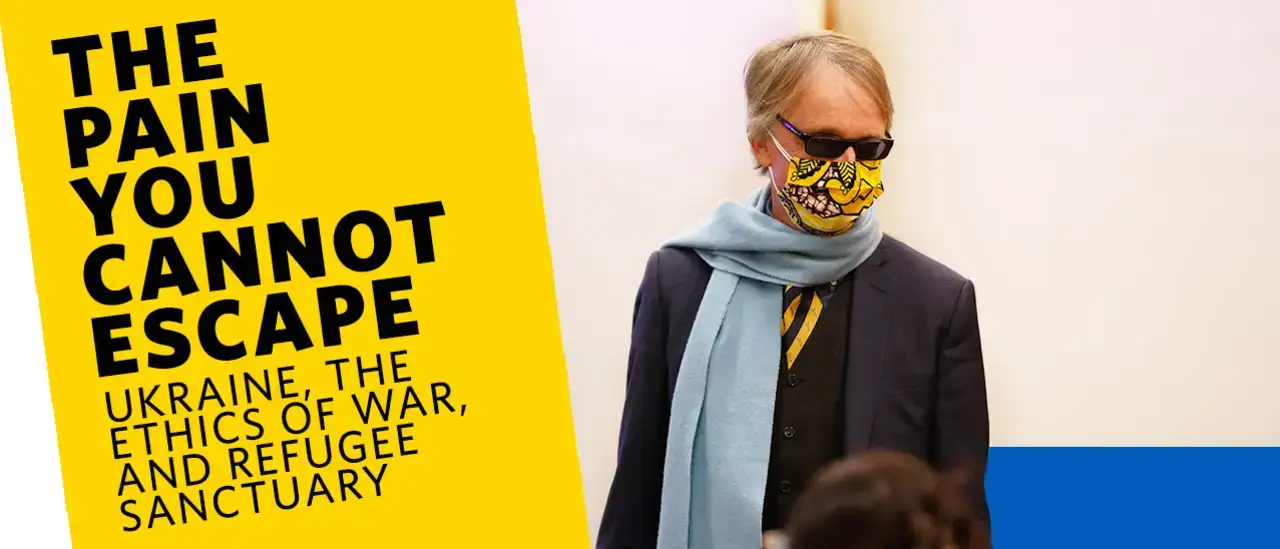The war in Ukraine became more than just a headline for SUNY Oneonta students, staff and community members who attended a powerful on-campus panel discussion Thursday that let attendees hear from four Ukrainian professors whose lives have been turned upside down.
The event, called “The Pain You Cannot Escape: Ukraine, the Ethics of War, and Refugee Sanctuary,” was hosted by Associate Professor of Philosophy Dr. Achim Koeddermann and students in three of his classes. About 50 people gathered inside IRC Lecture Hall #2, with another 50 tuning in remotely, as Dr. Tetiana Matusevych, Dr. Mariia Umryk, Dr. Oksana Strutynska and Dr. Tetiana Yefymenko — all professors at the National Pedagogical Dragomanov University in Kyiv, Ukraine — answered questions, shared academic insights and told personal stories of terror, escape and hope via Zoom video call.
Just three years ago, Matusevych and other Dragomanov University colleagues were visiting campus in person to explore a possible academic partnership between the two institutions. That’s when she and Koeddermann formed a friendship and established a collaboration wherein their students could interact and learn from one another.
“We forged a relationship based on teaching our students on common ground,” Koeddermann said. “This semester, as tensions in Ukraine rose, we agreed that we could and should continue our class exchange and partnership. When the war broke out, I shifted my syllabus to cover just war theory, and we’ve also been planning and putting together this panel.”
The Pain You Cannot Escape
One by one, the women told audience members the ways in which their once-peaceful lives have been destroyed, doing their best to convey “a reality that is difficult to describe by words, but only by tears,” Matusevych said. Two of the women have safely fled to other countries, but two remain in Kyiv. One, unable to leave Kyiv, spoke to Oneontans from a bunker, the sound of an air raid siren punctuating her words.
In the past month, they have seen missile strikes from their living room windows and listened to explosions “every day and every night.” They spent days driving through traffic and roadblocks, trying to escape to nearby countries, and stood for hours at borders, suddenly refugees.
“I have never seen so many unfortunates crying, screaming, moaning people at the same time,” Matusevych said. “It was like a terrible dream... But no, this is a new, terrible reality. … Of course, we are trying to reflect on all of this as academics and researchers, but our reality does not allow that - we’re just trying to survive each day.”
One of the women had to leave her child at the border to Poland so she could return to her husband, who has joined the fight for independence in Ukraine. None of their male colleagues at the National Pedagogical Dragomanov University have been allowed to leave Ukraine. The university, which is as old as SUNY Oneonta, has been destroyed, but lives on virtually as they continue to teach remote classes, which are intermittently interrupted in order to take shelter.
A Life-saving Collaboration
When the war in Ukraine broke out, Koeddermann’s collaboration and partnership with Matusevych quickly morphed into more of a lifeline. Through her, he was introduced to the three other female professors, who all needed help finding safety. With a wide network of colleagues and friends in Europe, Koeddermann and other SUNY Oneonta faculty members were in constant contact with Matusevych and others, sharing information and, ultimately, helping them find shelter and protection.
Together — and with Koeddermann’s help — Matusevych, Umryk, Strutynska and Yefymenko are using their teaching and information technology skills to create remote learning opportunities for the millions of Ukrainian children who have been displaced by the war.
“We are safe now but with disquiet in our hearts,” said Umryk, who fled to Germany with her daughter while her husband stayed in Ukraine. “I want to come back to my country. I want to be in my home. I want to see my students, my husband, my relatives, my friends. Every day for me, it's very hard.”
“All of Them Knew”
Dr. Koeddermann is especially passionate about this cause because of his heritage. He remembers being a young boy growing up in Germany, walking with his grandmother and learning about the Holocaust as she muttered, “all of them knew.” He would realize later on that she was referring to the bystanders who saw the genocide happening and did nothing.
“I feel a collective form of guilt for the devastation of Ukraine during World War II,” he said, “and I feel I have a special responsibility to do something. I cannot close my eyes to this.”
Before and during the panel discussion, Koeddermann's students raised questions on topics ranging from whether war is ever morally justifiable to the role of social media in presenting "real" news. Discussing theoretical topics of philosophy and media ethics in a real-world context was an incredibly valuable teaching and learning experience, Koeddermann said, but more than that, Thursday’s event was a chance for the SUNY Oneonta community to achieve a deeper, more emotional understanding of the war.
During a Q&A portion of the discussion, Jena Dookie, a freshman from Long Island majoring in Environmental Sustainability, said she had “learned more today from this event than I have from anything I have seen in the news about the war.”
More than anything, Koeddermann wanted to recognize his four friends for their incredible bravery and humanitarian efforts, let them tell their stories, and assure them that they are not alone.
“I wanted these women to be heard and my students to see what does it really feel like for them to be living this war,” he said.
“This was not so much designed to be an intellectual lecture as much as it was a way to let these women know: You’re not forgotten, America remembers you, and there are people who take you seriously and want to help and will continue to do that.”
